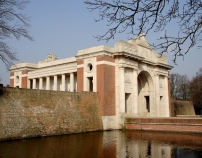| First Name: | Joseph Edward | Last Name: | BARGE | |
|---|---|---|---|---|
| Date of Death: | 23/10/1914 | Lived/Born In: | Marylebone | |
| Rank: | Private | Unit: | Gloucestershire1 | |
| Memorial Site: | Menin Gate, Ypres | |||
Current Information:Born-Marylebone Enlisted-London
First Battle of Ypres Between 21st October and 22nd November, 1914 a desperate fight took place around the Belgium city of Ypres, the first of three major battles that were to be fought there during the course of the war. British troops entered Ypres in October. The 1st and 2nd Divisions plus the 3rd Cavalry Division had made their way up from the Aisne as part of the “Race to the Sea”, whilst the 7th Division came west to Ypres after Antwerp had fallen. The Germans knew that Ypres was the gateway to the Channel ports and that these were vital to Britain’s war effort so they poured reinforcements into the area. The fighting fell into three distinct battles; the Battle of Langemarck, 21-24 October, the Battle of Gheluvelt, 29-31 October and the Battle of Nonne Bosschen, 11 November. Ypres did not fall to the Germans but its defence during these two months resulted in the destruction of much of the old regular British Army. First Battle of Ypres Between 21st October and 22nd November, 1914 a desperate fight took place around the Belgium city of Ypres, the first of three major battles that were to be fought there during the course of the war. British troops entered Ypres in October. The 1st and 2nd Divisions plus the 3rd Cavalry Division had made their way up from the Aisne as part of the “Race to the Sea”, whilst the 7th Division came west to Ypres after Antwerp had fallen. The Germans knew that Ypres was the gateway to the Channel ports and that these were vital to Britain’s war effort so they poured reinforcements into the area. The fighting fell into three distinct battles; the Battle of Langemarck, 21-24 October, the Battle of Gheluvelt, 29-31 October and the Battle of Nonne Bosschen, 11 November. Ypres did not fall to the Germans but its defence during these two months resulted in the destruction of much of the old regular British Army. As the result of a large German attack on 22nd October, Kortekeer Cabaret, near Langemarck had been captured and by the next day, 23rd October, a force from 1st Division had been gathered to retake it. The 1st Gloucestershire battalion of 3 Brigade were in reserve and small groups were sent off to pressure points in the front line to help in the defence. Two platoons went to the northern edge of Langemarck to fill a small gap in the line there and fought an all day battle against massed enemy attacks. Further south at the Kruiseecke cross roads on the main Menin Road, men from the Black Watch and Coldstream Guards were attacked and overwhelmed, allowing the enemy to then move north and get behind the British line. Some of 1st Gloucestershire were sent to secure the cross roads but were swept aside when they got there and fell back on the Grenadier Guards. Meanwhile D Company had been sent to cover Gheluvelt but only 15 out of 80 made it to the village. The British line was now breached to a width of 2,000 yards and the enemy could now advance along the Menin–Ypres road. The remaining companies of 1st Gloucestershire were at long stop at Veldhoek, just down the Ypres road and here they gathered together the remnants of the scattered battalions of 1st Division and stopped the German advance at 700 yards. The enemy fell back, 1st Gloucestershire chased after them and took 100 prisoners. Joseph Barge was a victim of the fighting on this day. |
||||
| « Back to Search Results | ||||
| If you think any of the information shown here is incorrect, Click Here to submit your amends and comments | ||||




